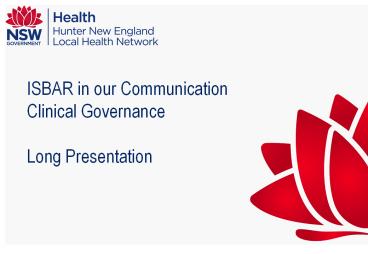ISBAR in our Communication Clinical Governance Long Presentation - PowerPoint PPT Presentation
1 / 32
Title:
ISBAR in our Communication Clinical Governance Long Presentation
Description:
Long Presentation Situation ... no information from attending MO re pregnancy ... for management of scc/infection. ? surgical intervention. ed/bed manager not ... – PowerPoint PPT presentation
Number of Views:247
Avg rating:3.0/5.0
Title: ISBAR in our Communication Clinical Governance Long Presentation
1
ISBAR in our CommunicationClinical
GovernanceLong Presentation
2
Situation
Clinical Governance Pursuing Quality, Safety
and Excellence
- Communication is an everyday practice
- Poor communication can harm people
- Today
- Background
- Evidence about communication
- What we did in response to that evidence
- Results
- Assessment
- Recommendation
- Training
3
Background
Clinical Governance Pursuing Quality, Safety
and Excellence
4
Clinical Governance Pursuing Quality, Safety
and Excellence
Background - Evidence about communication
In 2006, HNE Health staff notifying of incidents
identified that clinical communication was an
issue in 728 incidents. Of these 34 concerned
communication around transfer between facilities,
and 32 concerned communication over handover.
Incident Information Management System (IIMS)
5
Clinical Governance Pursuing Quality, Safety
and Excellence
Complaints associated with Communication Reported
through IIMS in 2006
6
Root Cause Analysis
Clinical Governance Pursuing Quality, Safety
and Excellence
- 127 reviewed
- 96 identified communication as a contributing
factor - Only 1 in 4 of those 96 had identified
communication as a contributing cause in the
initial incident notification
7
Clinical Governance Pursuing Quality, Safety
and Excellence
- At that time it was assessed that
- We needed to do better
- We needed to develop better ways to communicate
- We needed to prevent harm to those we are trying
to help
8
Clinical Governance Pursuing Quality, Safety
and Excellence
- We needed something that was
- Evidence-based
- Used with success in other hospitals and
high-risk organisations - Something that is
- Simple
- Easy to implement
- Conveys relevant information in a time-limited
way - Can be generalised across a range of settings
- Part of everyday practice
9
Clinical Governance Pursuing Quality, Safety
and Excellence
Our response to the evidence
- In March 2008 Clinical Governance was funded to
develop, train staff to use and evaluate the
utility of a simple communication framework ISBAR
10
Clinical Governance Pursuing Quality, Safety
and Excellence
- ISBAR inter-hospital transfer project March
2008-March 2009 - Tracked 77 patient transfers TMH to JHH/ RNC,
before and after staff were trained in ISBAR - Staff training evaluated
- Asked clinical, ward and transport staff and
patients and carers to rate quality of
communication concerning transfer
11
Results training had impact for staff!
Clinical Governance Pursuing Quality, Safety
and Excellence
12
Clinical Governance Pursuing Quality, Safety
and Excellence
13
Results training had impact for patients
Clinical Governance Pursuing Quality, Safety
and Excellence
14
Results training improved staff communication
Clinical Governance Pursuing Quality, Safety
and Excellence
15
Results patient documentation improved
Clinical Governance Pursuing Quality, Safety
and Excellence
16
Clinical Governance Pursuing Quality, Safety
and Excellence
Assessment
- The data were assessed by the AET as compelling
Recommendation
Clinical Governance recommended that all staff be
trained to use ISBAR for professional
communication In response to the data and the
recommendation Clinical Governance has been
charged with leading an Area-wide program to
train all staff to use ISBAR for professional
communication
17
Training - So what is ISBAR?
Clinical Governance Pursuing Quality, Safety
and Excellence
- Introduction
- Situation
- Background
- Assessment
- Recommendation
18
ISBAR
Clinical Governance Pursuing Quality, Safety
and Excellence
- Introduction
- Who, what and where you are and why are you
calling - Situation
- What is happening now
- Background
- What led to the situation
- Assessment
- What you think the problem is
- Recommendation
- What should we do to correct the problem
19
ISBAR
Clinical Governance Pursuing Quality, Safety
and Excellence
- Introduction
20
ISBAR
Clinical Governance Pursuing Quality, Safety
and Excellence
- Situation
21
ISBAR
Clinical Governance Pursuing Quality, Safety
and Excellence
- Background
22
ISBAR
Clinical Governance Pursuing Quality, Safety
and Excellence
- Assessment
23
ISBAR
Clinical Governance Pursuing Quality, Safety
and Excellence
- Recommendation
24
What will ISBAR do for me?
Clinical Governance Pursuing Quality, Safety
and Excellence
- Ensures completeness of info and reduces
likelihood of missed data - Is an easy and focussed way to set expectations
for what will be communicated - Standardises communication between everyone
Doctor-Nurse, Nurse-Nurse, Doctor-Physio as well
as wardsmen, housekeeping and clerical staff - Helps organise what needs to be said
- Ensures a recommendation is clear and
professional - Gives confidence in communication
25
Clinical Governance Pursuing Quality, Safety
and Excellence
- The ISBAR format can be used in all forms of
communication - Clinical Handover
- Referrals
- Reports (Ward, AET etc)
- Protocols, memos and emails
- Personal interactions
26
Clinical Governance Pursuing Quality, Safety
and Excellence
27
Remember ISBAR
Clinical Governance Pursuing Quality, Safety
and Excellence
- I Introduction - I am
- S Situation - Whats going on
- B Background - Brief, relevant history
- A Assessment - What I think is happening
- R Recommendation - What you are asking them to
do
28
Exercise
Clinical Governance Pursuing Quality, Safety
and Excellence
- Think of how you may write a brief précis about
this meeting. Use the page provided to write down
elements of the day. - Introduction I am and I attended a meeting
this week in my capacity as - Situation the purpose of the meeting was to
- Background- the meeting had been organised to.
- Assessment the outcome was
- Recommendation (I am telling you this because)
I am asking you to/ I would like you to/ I am
requesting that.
29
Everything should be made as simple as possible
but no simpler
30
Clinical Governance Pursuing Quality, Safety
and Excellence
31
Clinical Governance Pursuing Quality, Safety
and Excellence
- Think Talk
- Write ISBAR
32
Clinical Governance Pursuing Quality, Safety
and Excellence

